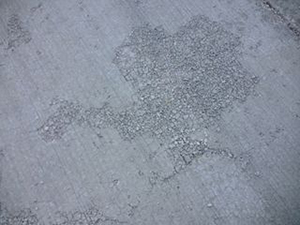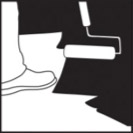Seal the Deal is intended to be an informative and educational publication for ChemMasters’ network of independent manufacturer’s representatives, distributors and contractors. We don’t want to make you chemical engineers, but we do want to help you feel better informed and more comfortable discussing construction chemicals. If there are specific products or topics you would like to see addressed in a future issue, please contact
John Fauth.
Freeze/Thaw & Deicing Chemical Damage
This is the time of year when much of the country reacquaints itself with that four letter word again… snow, and his close friend ice. Both of which contribute to a seasonal increase in slip and fall accidents and the use of deicing chemicals.
Indirectly, deicing chemicals can do significant harm to concrete. Over time, the chloride (salt) component of many deicing chemicals (such as rock salt) is solubilized into water and carried to underlying rebar, causing it to corrode (rust). As steel corrodes it expands, causing the concrete to delaminate. This delamination is what causes potholes on highways, and can inflict much the same damage on your driveway, walkways and patio.
If that weren’t enough, deicing chemicals magnify the damage to concrete caused by freeze/thaw cycling. As warm temperatures melt ice and snow, water is created and absorbed into the porous concrete, which is similar to a hard sponge. As temperatures drop again, that water re-freezes and expands, causing the concrete to crack and spall. Although properly cured concrete is very strong in compressive strength, it’s relatively weak in tensile strength that counters the internal forces created by expansion as water freezes.

Freeze/thaw cycles and deicing chemicals cause damage such as spalling and scaling.
Deicing chemicals work by temporarily lowering the melt point of snow and ice, causing them to melt and creating water that re-freezes over and over again. De-icing chemicals will also allow concrete to become “super saturated”, and hold more water than concrete without deicing chemicals. More water means more expansion as it freezes, and more damage.
As a result, deicing chemicals cause concrete to undergo more frequent and damaging freeze/thaw cycles. Some deicers are better or worse than others. It’s advisable to do some research on the chemistry of any deicer before deciding whether to use it on your own concrete. Test results are easy to find online.
What can you do to protect your concrete from the ravages of freeze/thaw cycles and deicing chemicals? First, you can use a concrete sealer that inhibits the absorption of water and chlorides (salts) that do the most damage during repeated freezing and thawing episodes. If you have decorative concrete and desire a gloss and “wet look”, choose one of the high quality ChemMasters film forming products.
But if you have broom or smooth finished concrete, one of the ChemMasters penetrating products offers superior protection from damage caused by freeze/thaw cycling and deicing chemicals.
Seal the Deal is intended to be an informative and educational publication for ChemMasters’ network of independent manufacturer’s representatives, distributors and contractors. We don’t want to make you chemical engineers, but we do want to help you feel better informed and more comfortable discussing construction chemicals. If there are specific products or topics you would like to see addressed in a future issue, please contact
John Fauth.

 Seal the Deal
Seal the Deal

